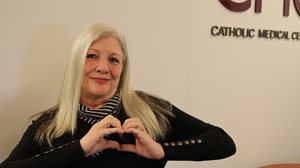 Like many other women, Paula Cavallo didn’t realize she was having a heart attack. She attributed her symptoms to GERD (gastroesophageal reflux disease), except, she remembers, “I also had an achy jaw that lasted for over an hour. My arms and wrists felt bad and I couldn’t snap out of it.”
Like many other women, Paula Cavallo didn’t realize she was having a heart attack. She attributed her symptoms to GERD (gastroesophageal reflux disease), except, she remembers, “I also had an achy jaw that lasted for over an hour. My arms and wrists felt bad and I couldn’t snap out of it.”
When Cavallo did go to the hospital, she found out she had suffered a sudden coronary artery dissection — or SCAD — heart attack. “I connected with Dr. (Michelle) Ouellette that night. I believe, truly, that’s why my life was saved.”
Dr. Michelle Ouellette, an interventional cardiologist with CMC’s New England Heart and Vascular Institute, noticed the tear in Cavallo’s artery. Fortunately, Ouellette specializes in SCAD.
“A SCAD heart attack defies what we typically assume about a heart attack. It happens mostly to women who are often younger and otherwise healthy,” said Ouellette. “Women who have a SCAD don’t necessarily have clogged arteries or other signs of heart disease.”
Cavallo’s story is one example why the New England Heart and Vascular Institute is starting a program focused on women’s heart health. Women – even otherwise healthy women – are susceptible to conditions like SCAD and fibromuscular dysplasia. Several factors, like genetic history, onset of menopause, pregnancy complications, diabetes, kidney disease, smoking, and poorly-managed stress all play a role.
“Women have unique cardiovascular risks and symptoms, yet many do not understand what those are,” Ouellette said. They also may experience a heart attack differently from the way men do with, “flu like symptoms and nausea instead of crushing chest pain. They’ll go to bed not realizing they’re having a heart attack, so we want to make women aware of their unique symptoms and empower them to get checked out if something really doesn’t feel right.”
Ouellette is joined in the program by cardiologists Besiana Liti, Sylvia Yang and Jonathan Eddinger, as well as Kristine Ziemba, APRN, and Adrienne Capen, PA-C. All of them are focused on women’s unique cardiovascular health issues.
“Our team is taking a dual approach for women who already have or are at high-risk for disease. We are treating their condition if they have one, but we are also working with them on prevention, education and lifestyle changes,” said Ouellette.
Cavallo’s SCAD has healed with medication. With regular checkups and her SCAD support groups, she has a lot to look forward to.
“My youngest just got married; my 10th grandchild and third great-grandchild are on the way. There are so many spiritual things happening to me and I feel like my mission isn’t done. If Dr. Ouellette hadn’t been there, having that knowledge and finding my SCAD, I don’t know if I would have survived.”
Published in the Union Leader, Jan 26, 2019